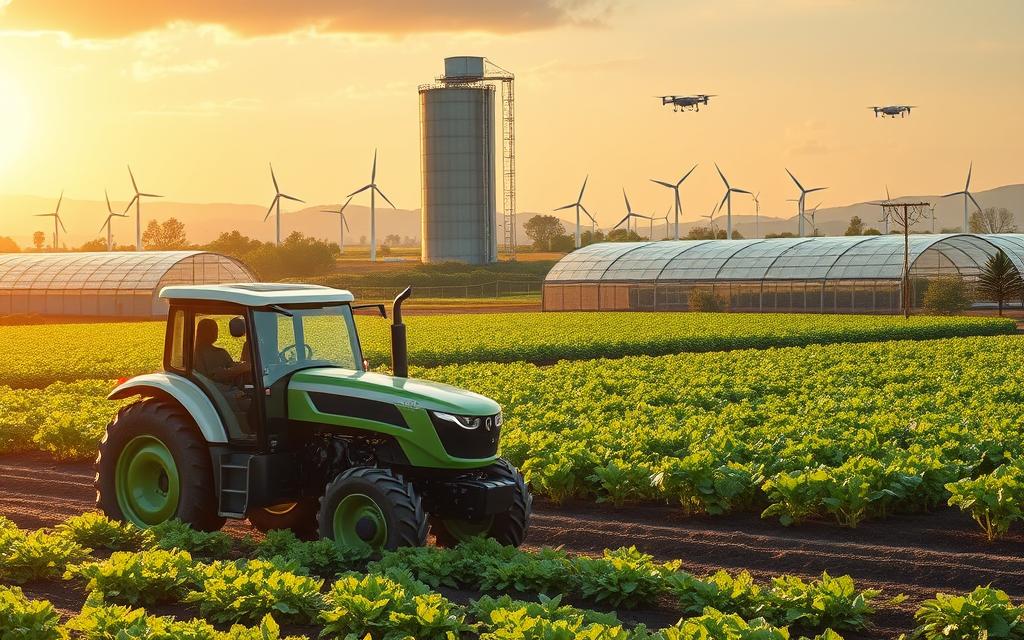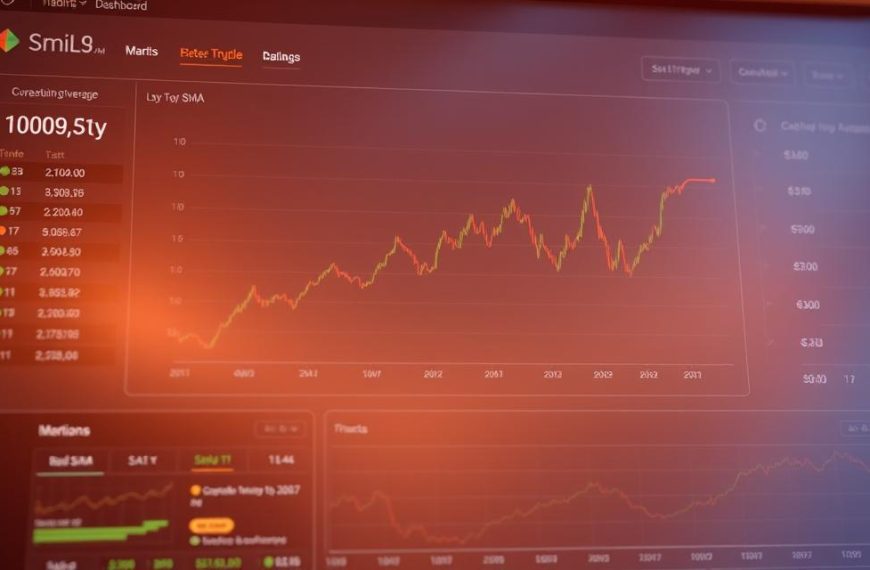Agricultural technology offers innovative solutions to global food challenges. It merges agriscience with sustainable farming, boosting efficiency and environmental responsibility1.
By 2050, the world’s population will reach nearly 10 billion. This growth demands technological interventions to ensure food security and sustainable production1.
The AgTech sector is booming, with global revenue set to hit US$18 billion by 2024. Precision agriculture tech is enhancing productivity and reducing carbon emissions1.
IoT devices in agriculture are growing rapidly. By 2024, about 300 million IoT devices will be used in farming1.
These advancements are changing how farmers manage crops and resources. They’re making cultivation and monitoring more efficient and effective.
Sustainable farming is now a pressing need. Agricultural technology provides advanced tools to tackle environmental issues2.
These tools help optimise resource use and boost global food production. They’re crucial for meeting our growing food demands sustainably.
What is Agriscience and Technology?
Agriscience and technology are changing farming methods. They use data and science to solve global food challenges3. This field combines scientific knowledge with advanced tech to boost food production.
Agricultural technology has evolved over thousands of years. It started with the Neolithic Revolution and now includes precision farming3. Key developments include irrigation systems, machinery, and digital tech.
Understanding Modern Agricultural Innovation
Modern agricultural innovation improves farming efficiency through various technologies. These include:
- Smart agriculture technologies4
- Precision farming tools
- Advanced data analytics platforms
- Agricultural robotics and automation3
Key Components of Agricultural Technology
Agricultural technology has great potential to transform farming practices. Here are some key components:
| Technology | Impact |
|---|---|
| GPS Systems | Enables precise field mapping and resource management5 |
| AI Predictive Tools | Forecasts weather patterns and crop yields4 |
| Smart Irrigation | Reduces water consumption by up to 25%4 |
Impact on Modern Farming Methods
Agricultural technologies have changed farming practices significantly. Less than 5% of global farmers use next-gen tech, showing room for growth4. These innovations promise better productivity and sustainability.
Precision farming and smart agriculture help farmers use resources wisely. They reduce environmental impact and improve overall agricultural productivity3.
Global Agricultural Challenges and Future Demands
The world’s farming landscape faces big hurdles in ensuring food for all. We must prepare for major changes in food production to meet growing needs. By 2050, we’ll need 70% more food calories for 9.7 billion people.
Climate change poses significant threats to farming systems worldwide. Land decay affects crop yields. Water scarcity endangers plant growth.
Other key issues include less farmable land and growing environmental stress.
- Land degradation affecting agricultural productivity6
- Water scarcity threatening crop cultivation6
- Reduced arable land availability
- Increasing environmental pressures
New tech offers hope for these complex issues. Precision agriculture and better connectivity could boost farming’s economic value. By 2030, smart tech could add $500 billion to global GDP through farming.
Emerging technologies can transform food security:
- Advanced crop monitoring systems
- Enhanced livestock tracking
- Autonomous farming machinery6
The UK is gearing up to tackle these global farming challenges. It’s focusing on innovative research and tech development. By using cutting-edge farm tech, the UK can help feed the world sustainably.
Precision Agriculture: Transforming Traditional Farming
Precision agriculture is revolutionising farming with cutting-edge technologies. It empowers farmers to optimise crop production and manage resources efficiently. GPS farming and IoT are driving this shift, enabling data-driven decisions with unparalleled accuracy7.
Modern agricultural technologies are boosting farming efficiency remarkably. Precision agriculture can increase crop yields by up to 30%. It also reduces water usage by 20-50%7.
These innovations offer practical solutions to real-world agricultural challenges. They’re not just theoretical concepts, but tools farmers can use today.
GPS and IoT Integration in Farming
GPS and IoT technologies have transformed traditional farming practices. Farmers now use advanced tools that provide real-time data for better decision-making.
- Daily satellite imagery for crop health monitoring7
- Precise soil moisture analysis7
- Weather data integration for optimal planning7
Data-Driven Decision Making
Data-driven farming allows for targeted resource application. This reduces environmental impact and operational costs. Farmers using these technologies often recoup their investments within a few growing seasons7.
| Technology | Efficiency Improvement | Resource Savings |
|---|---|---|
| Precision Irrigation | Up to 40% | 8-50% Water Reduction |
| Targeted Pesticide Application | Up to 20% | 15-20% Pesticide Reduction |
Resource Optimisation Technologies
Advanced resource optimisation technologies are vital for sustainable agriculture. Precision farming tools significantly improve crop management. They reduce carbon footprints and create opportunities for premium market positioning78.
Vertical Farming Solutions and Urban Agriculture
Urban agriculture is changing food production through innovative vertical farming. These methods are revolutionising sustainable food systems in cities. By 2050, two-thirds of people will live in urban areas.
Vertical farming offers remarkable advantages for urban food production:
- Water conservation up to 95% compared to traditional farming9
- Space efficiency, saving approximately 80% of agricultural land9
- Higher nutrient density in crops, with 15-25% increases in antioxidants9
UK innovators are spearheading the vertical farming revolution. Fischer Farms has invested £25 million in this technology. They supply 6.5 tonnes of fresh produce daily to supermarkets9.
The USDA backs urban agricultural innovations through various grant programmes. These initiatives aim to tackle food security issues. They also support new farmers and promote innovative production methods10.
Challenges remain, including high start-up costs and energy demands. Yet, vertical farming offers hope for sustainable urban agriculture. It’s a promising solution to future food production challenges.
Genetic Engineering and Crop Enhancement
Agricultural innovation evolves through groundbreaking genetic engineering techniques. Modern biotechnology is revolutionising crop production by developing smarter, more resilient plant varieties. These new varieties address global agricultural challenges11.
Understanding CRISPR Technology in Agriculture
CRISPR technology enables precise modifications in crop DNA. Scientists can target specific genetic sequences to enhance crop characteristics. These include drought tolerance, nutrient content, and pest resistance11.
This innovative technique allows researchers to develop climate-resistant crops with unprecedented accuracy12.
- Precise genetic modification of plant genomes
- Enhanced crop resilience
- Improved nutritional profiles
Developing Climate-Resistant Crops
Climate change poses significant challenges to global agriculture. Genetic engineering offers promising solutions by creating resilient crops. These crops can withstand extreme environmental conditions13.
Researchers have successfully developed crop varieties with:
- Increased drought tolerance
- Better resistance to pest attacks
- Improved yield potential
Biotechnology Advancements
The global agricultural landscape is transforming through biotechnology. About 26 countries now cultivate genetically modified crops. This brings significant economic benefits, reaching up to £100 billion annually11.
The United Kingdom is exploring innovative genetic engineering techniques. These efforts aim to enhance food security12.
“Genetic engineering is not just about changing crops, it’s about securing our future food supply” – Agricultural Research Institute
More sophisticated genetic engineering methods are being developed. This increases the potential for creating sustainable, resilient agricultural systems13.
Robotics and Automation in Modern Agriculture
Agricultural robotics is changing UK farming practices. Smart machinery brings precision and efficiency to traditional methods. These innovations help farmers boost productivity and tackle challenges.
Drones are vital in modern farming. They can map large areas quickly. These tools assess crop growth and field health.
Advanced technologies provide key data for strategic choices. This helps farmers make informed decisions about their operations.
- Automated farming technologies can deliver substantial economic benefits
- Precision agricultural robots reduce manual labour requirements
- Smart machinery enables more sustainable farming practices
Agricultural robotics has a big economic impact. Autonomous farming can generate over £400 per acre yearly. This could quadruple returns on automation investments14.
Currently, less than 5% of farmers use next-gen automation tech. This shows there’s plenty of room for growth in the sector14.
Environmental sustainability drives agricultural robotics development. Automated spraying can cut herbicide use by 80%. This saves money and reduces ecological impact14.
The European Green Deal aims to reduce pesticides. This highlights the importance of these technological innovations14.
The future of farming lies in the seamless integration of robotics, data analysis, and sustainable practices.
Robotics and automation are crucial for global food production. They’ll play a key role in addressing future farming challenges15.
Blockchain Technology in Agricultural Supply Chains
Blockchain is revolutionising the agricultural sector. It enhances food traceability and supply chain management16. This technology offers transparency and security, addressing key challenges in agricultural supply chains.
Blockchain in agriculture tracks food from farm to table. It’s a digital ledger system that creates immutable product journey records. Health, safety, and transparency now drive over half of consumer purchases16.
Traceability and Food Safety
Food safety is crucial in modern agriculture. Blockchain offers robust tracking through complex supply chains16. Dole, Nestlé, and Walmart use blockchain to improve tracking and reduce illness risks16.
- Provides transparent tracking of agricultural products
- Reduces risks of contamination
- Enables quick identification of product origins
Smart Contracts in Agriculture
Smart contracts are a revolutionary blockchain application in agriculture. These digital agreements execute automatically when conditions are met. They streamline transactions between farmers, distributors, and retailers.
Supply Chain Transparency
Blockchain creates interconnected checkpoints throughout the agricultural supply chain16. It documents harvest dates, farm locations, and transport conditions. This increases transparency and trust in the food system17.
The potential for improved traceability could significantly increase the marketability and value of agricultural products16.
The blockchain market in agriculture is growing rapidly. It’s projected to rise from £106 million in 2020 to £760 million by 202516. This growth shows its increasing importance in modern farming.
Sustainable Farming Practices and Environmental Impact
UK farmers are adopting eco-friendly methods that prioritise soil health and biodiversity. These sustainable practices address environmental challenges in modern farming. Crop diversity techniques can improve pest control and reduce chemical pesticide use significantly.
Regenerative agriculture offers promising solutions for environmental conservation. Key strategies include:
- Cover cropping to reduce soil erosion by 90%18
- No-till methods decreasing soil erosion rates by 80%18
- Integrated Pest Management reducing pesticide use by 30-50%18
Innovative technologies support these sustainable practices. Precision agriculture can improve crop yields through optimised resource management. Smart irrigation systems reduce water usage by up to 50%.
The economic benefits of sustainable agriculture are substantial. Farms integrating livestock and crops can increase productivity significantly. Agroforestry practices can boost farm profitability by 30%.
Farmers adopting sustainable practices can experience a 30% increase in profitability over five years. This demonstrates the financial viability of eco-friendly farming methods.
Sustainable farming is not just an environmental strategy, but a comprehensive approach to agricultural productivity and resilience.
UK farmers are leading in global sustainable agriculture. They’re creating a more resilient and environmentally responsible food production system. This approach benefits both the environment and farm profitability.
Government Policies and Support for Agricultural Innovation
The UK leads in transforming agricultural policy through strategic government investments. In 2013, the agri-tech strategy allocated £160 million to boost farming technology innovation19. This investment aims to revolutionise agricultural practices by backing cutting-edge research and development20.
The government’s dedication to agricultural innovation shines through its comprehensive funding approach. Several key initiatives showcase this commitment.
- £70 million invested in the Agri-Tech Catalyst supporting projects from laboratory to market20
- £90 million allocated for Centres for Agricultural Innovation20
- Strategic funding for innovative agri-tech projects across the United Kingdom19
Farming subsidies now encourage technological adoption. The government recognises innovation funding’s vital role in tackling global challenges. By 2050, global food production must increase to meet rising population demands20.
| Year | Investment Area | Amount |
|---|---|---|
| 2013 | Agri-Tech Strategy | £160 million |
| 2014-2016 | Agricultural Innovation Projects | £38.8 million |
The agricultural policy landscape is evolving to support sustainable, technology-driven farming practices that can meet future global food security challenges.
Agricultural innovation is not just about technology, but about creating sustainable solutions for our future food systems.
The Future of Agriscience and Technology in the UK
The UK farming sector is on the brink of a tech revolution. Innovative solutions are transforming traditional practices, boosting efficiency and sustainability21.
The Digital Technology Farm (DTF) project is leading agricultural innovation. Key trial sites include Revesby Estate in Lincolnshire, Montrose in Scotland, and Throws Farm in Essex.
These sites will use cutting-edge tech like Skippy Scout drones, soil nitrogen sensors, and advanced disease prediction models.
UK agriculture has shown impressive growth. From 1961 to 2018, cereal output rose by 330% and meat production by 480%22.
By 2050, the global population may reach 9.7 billion. This increase highlights the need for innovative farming solutions23.
| Technology | Potential Impact | Efficiency Gain |
|---|---|---|
| AI in Agriculture | Crop Yield Optimization | 10-20% Increase |
| Smart Irrigation | Water Conservation | 20-50% Reduction |
| Autonomous Tractors | Operational Efficiency | 30% Productivity Boost |
The UK aims to achieve net zero emissions by 204021. This goal shows a strong commitment to sustainable farming.
Farmers will play a key role in adopting new tech. Their efforts will help create a resilient and productive agricultural future.
Conclusion
The UK’s sustainable agriculture future relies on innovation and smart tech integration. Agricultural technology offers solutions to complex food security issues24. Advanced tech can optimise resources and boost productivity, leading to transformative change.
Digital farming tech is changing UK agriculture practices. It enables precise decisions and better resource use24. Farmers can increase yields and reduce environmental impact with GPS, drones, and data-driven tools24.
The global precision farming market’s growth shows these tech interventions’ potential24. Teamwork between researchers, policymakers, and farmers will drive sustainable innovation.
The UK can lead in developing eco-friendly farming solutions. These solutions can tackle climate issues and boost food security24. They can also improve the farming sector’s economic strength.
Ongoing investment in research and skills is crucial. Supportive policies will help realise this transformative potential in UK agriculture.
FAQ
What exactly is agriscience and technology?
Agriscience and technology apply scientific principles to modern farming. They use advanced tools like precision farming and smart sensors. These innovations improve crop yields and promote sustainable farming methods.
How are technological innovations addressing global food security challenges?
Tech innovations boost farming efficiency and develop climate-resistant crops. They optimise resource use and increase agricultural productivity. Vertical farming and precision agriculture help produce more food with fewer resources.
What is precision agriculture?
Precision agriculture uses digital tech to monitor and optimise crop production. It employs GPS, IoT sensors, and data analytics. Farmers can make data-driven decisions and apply resources more precisely.
What are the benefits of vertical farming?
Vertical farming allows year-round crop production and saves water. It needs minimal land and can grow food in urban areas. Using LED lighting and hydroponic systems, it produces fresh food near consumers.
How is genetic engineering improving agricultural sustainability?
Genetic engineering, especially CRISPR, develops crops with enhanced traits. These include climate resistance and increased nutritional content. Such advancements help farmers adapt to changing environments and reduce chemical use.
What role do robotics play in modern agriculture?
Agricultural robotics introduce autonomous systems like robotic tractors and crop-monitoring drones. These technologies increase efficiency and reduce labour costs. They also improve precision in farming tasks and address labour shortages.
How can blockchain technology benefit agricultural supply chains?
Blockchain provides transparent and secure record-keeping in agriculture. It allows consumers to track food from farm to table. The technology enables smart contracts and increases trust in the agricultural ecosystem.
What are sustainable farming practices?
Sustainable farming includes organic farming and regenerative agriculture. These methods focus on soil health and preserving biodiversity. They aim to create eco-friendly agricultural systems that support long-term ecological balance.
How is the UK government supporting agricultural innovation?
The UK government funds research and offers tax incentives for agricultural innovation. It provides subsidies for adopting new technologies. Post-Brexit, there are more chances to develop tailored support for UK agriculture.
What emerging technologies might shape future agriculture?
AI, advanced robotics, and nanotechnology are set to revolutionise agriculture. Enhanced data analytics will also play a crucial role. These innovations will likely boost farm productivity and improve resource management.
Source Links
- https://www2.deloitte.com/us/en/insights/industry/technology/technology-media-and-telecom-predictions/2024/agricultural-technology-predictions.html
- https://igrownews.com/agricultural-technology-trends-challenges-of-2023-part-1/
- https://en.wikipedia.org/wiki/Agricultural_technology
- https://www.icl-group.com/blog/technologies-revolutionizing-agriculture-agtech/
- http://www.iowapbs.org/iowapathways/mypath/2497/science-and-technology-agriculture
- https://www.mckinsey.com/industries/agriculture/our-insights/agricultures-connected-future-how-technology-can-yield-new-growth
- https://farmonaut.com/usa/revolutionizing-california-agriculture-farmonauts-precision-farming-solutions-for-sustainable-crop-protection-and-yield-optimization/
- https://www.edf.org/sites/default/files/documents/ag-tech-discovery-report.pdf
- https://www.tbsnews.net/tech/vertical-farming-propelling-agriculture-new-era-sustainability-865251
- https://www.usda.gov/topics/urban/innovative-production
- https://royalsociety.org/news-resources/projects/gm-plants/what-is-gm-and-how-is-it-done/
- http://www.nature.com/scitable/topicpage/genetically-modified-organisms-gmos-transgenic-crops-and-732
- https://pmc.ncbi.nlm.nih.gov/articles/PMC9680014/
- https://www.mckinsey.com/industries/agriculture/our-insights/trends-driving-automation-on-the-farm
- https://www.agritechtomorrow.com/article/2022/06/2022-top-article-drones-and-robotics-in-agriculture/13796
- https://www.corteva.com/who-we-are/outlook/traceability-blockchain-food-supply.html
- https://agsci.psu.edu/magazine/articles/2023/winter-spring/the-future-of-farming
- https://www.ucsusa.org/resources/what-sustainable-agriculture
- https://www.gov.uk/government/collections/agricultural-technologies-agri-tech-strategy
- https://assets.publishing.service.gov.uk/media/5a7c575540f0b6321db388ae/9643-BIS-UK_Agri_Tech_Strategy_Accessible.pdf
- https://www.agrii.co.uk/news-and-media/news/the-field-of-the-future-the-digital-technology-farms/
- https://strategicallies.co.uk/article/the-future-of-agricultural-technology/
- https://livefarmer.co.uk/agriculture-4-0-the-future-of-farming-technology/
- https://eos.com/blog/agricultural-technology/












